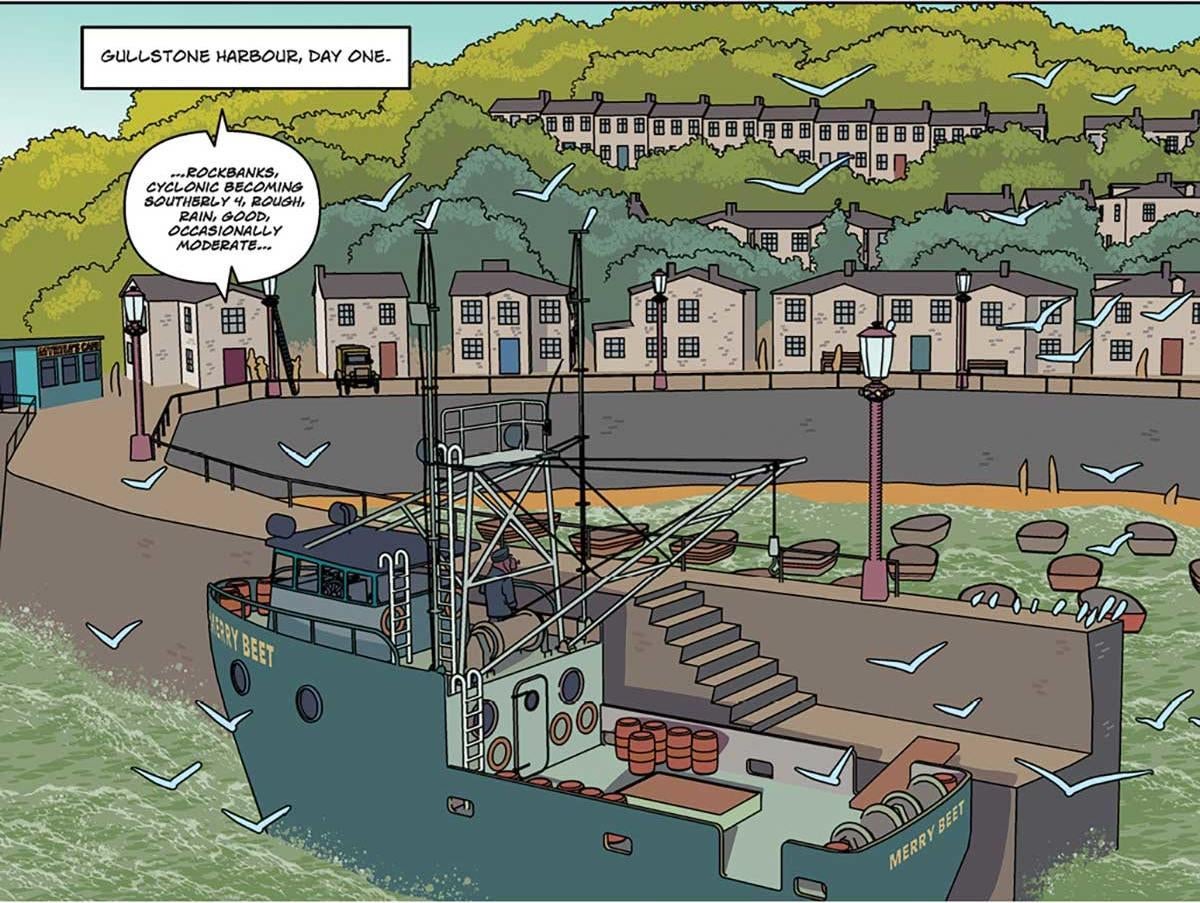Wild's End #1 Review: A Confident Return for a Compelling Comic
Wild's End #1 reintroduces readers to the world created by writer Dan Abnett and artist I.N.J. Culbard, a paring that may also be familiar from their excellent 2000 AD serial "Brink." As in the previous Wild's End series, the story occurs in a green and pleasant version of England populated by anthropomorphic animals. With an alien invasion resulting in the collapse of established society, Wild's End reads like a blend of The War of the Worlds, The Wind in the Willows, and The Walking Dead.
Abnett and Culbard cleverly avoid retreading old ground while still creating an inviting entry point for new readers by introducing a brand-new cast of characters from a seaside town not visited in previous Wild's End stories and then sending them off to sea. During the month they spend on the water, the original series' events transpire, and they're left to piece it together upon their return. The structure may create different reading experiences for newcomers and longtime fans as the latter will already know the answers to the questions raised upon the ship's return, providing greater context but less tension.

Abnett and Culbard do a remarkable job of defining their world and its character in only a few pages. The opening page alone, silent but for the ship's radio, introduces the ship's skipper, the old photograph of him with his son pinned on the wall hinting at a sadness that will come into greater focus as the issue progresses. Similarly, it takes one conversation between the town's only reporter and a local politician to convey the quaintness of the seaside setting. The scene occurring by the dock brings the rest of the crew together organically, giving each character a succinct but clear personality spotlight – dependable Flo, romantic Roddy, the slightly odd twins who somehow aren't related, and the skipper's troubled grandson Eddie each are well-defined before they ever set sail.
But there's a depth to these characters that only becomes clear as the issue progresses, chronicling their 30 days at sea and premature return to harbor. Abnett and Culbard craft one intimate scene after another, each peeling back a layer to get closer to the core of who these people are, be that loss, trouble at home, or unfulfilled potential. Culbard shines in these quiet, one-on-one conversations, coloring the world in bold, idyllic primary hues and framing scenes to make the countryside and sea seem expansive, neverending, and beautiful. These layouts brilliantly contrast with the dinner scene below deck, forcing the crew into close quarters. It's then that the seething animosity over the future ownership of the vessel, the skipper's fading memory, and Eddie's unearned place on the crew all bubble to the surface under sickly yellow lighting.
As in previous installments, the impact of "Foreign Wars" still looms over the land in Wild's End #1. Rather than exploring it directly, as with veteran Navyman Clive in the original series, here we see how the war affected those who stayed home, filling the vacuums left by those who went off to fight and still carrying the weight of the absence of those who never returned. The skipper looks to his grandson to fill the role left behind by his son, while that son's wife, Flo, is only aboard the ship because she took his place during wartime.
By the time the ship returns to shore to find its town abandoned, it's unclear what future lies ahead for any of the ship's crew, and that's before they realize the rest of the town's population has vanished. The previous Wild's End series was about how simple human decency, compassion, and common sense can be akin to heroism during times of crisis when paranoia, suspicion, and ambition are rampant. We don't know yet where Abnett and Culbard are taking this tale—there were enough unexpected twists and turns in the original run that I wouldn't make assumptions—but by the time the issue's over, each of the main cast is without those who were their family and may perhaps turn to one another to fill those roles.
Wild's End stands out from many of its peers from how confident it is in its storytelling. Where contemporary first issues often feel like a hard sell for whatever high concept or elevator pitch got the creative team's foot in the door, Abnett and Culbard lead with impeccable craft, a deliberate pace, and plenty of room to let their characters reveal themselves to the readers. It's as comforting and contemplative as its pastoral setting but doesn't shy away from turning grisly when the moment calls for it. Wild's End #1 is more than worthy of reader attention, and they should settle in somewhere cozy for the long haul.
Published by Boom Studios
On June 21, 2023
Written by Dan Abnett
Art by I.N.J. Culbard
Colors by I.N.J. Culbard
Letters by I.N.J. Culbard
Cover by I.N.J. Culbard
0comments